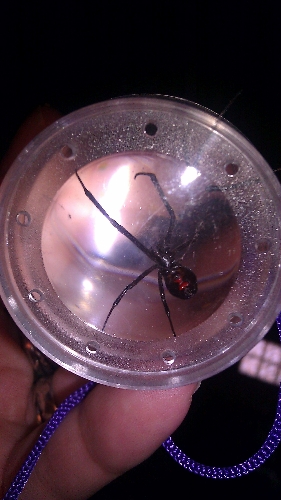Black widows, desert browns are apt to make your skin crawl
It's a scene out of hundreds of movies: A giant tarantula the size of a man's fist crawls across a sleeping person while menacing music plays. In reality, it's the tarantula that's more likely to be menaced, according to area experts.
Science hasn't come up with a definitive answer as to why spiders elicit fear in most people.
Elsie Sellers, Clark County Wetlands Park coordinator, said tarantulas are more likely to be seen in the fall and spring, when the males are out on the prowl, looking for female tarantulas in their underground lairs.
"I love tarantulas," Sellers said. "They are so cool. Their eyes are big enough that sometimes if you're driving at night, you can pick up eye shine from them."
Sellers said she had a lot of experience with spiders in her former position as wildlife education coordinator for the Nevada Department of Wildlife. She said tarantulas are fairly fragile and sensitive to sound and will jump back after hearing loud noises, such as shouting.
"They're not interested in humans," Sellers said. "If you see one in the wild, just give it some room and take pictures."
She noted a defense mechanism that tarantulas use when they are in danger of becoming prey to a small animal, such as a rodent.
"They rear up and scratch their belly with their front legs," Sellers said, "That releases little hairs at the eye, which can be enough of an irritation and distraction that the tarantula can escape."
Clark County Vector Control supervisor Chris Bramley is a fan of tarantulas, too.
"They're very beneficial," he said. "Most spiders are beneficial. They reduce the population of a lot of pest insects."
Bramley said there are only two kinds of spiders that humans need to be concerned about in the Las Vegas Valley - the black widow and the desert brown, a similar species to the brown recluse.
"The desert brown has a similar necrotic neurotoxin but definitely not as severe as the brown recluse," Bramley said.
A necrotic neurotoxin causes the skin around the bite to die and can sometimes require a skin graft to repair the damage.
Bramley said that, like its cousin the recluse, the desert brown prefers to be away from activity and is more likely to be found in out-of-the way and quiet places.
"You're more likely to run into them in something like clothes you've had in storage in the garage," he said. "You want to pay attention if you're gardening or during spring cleaning."
Sellers said the desert brown is not a particularly distinctive-looking spider at normal viewing distance, but when seen through a magnifying glass, preferably while it's in a sealed jar, the viewer can see a distinctive "smiley face" arrangement of the eyes.
"They also have very fragile-looking legs," she said. "To be honest, if something looks like it might be a desert brown in my house, it gets squished, simply because I don't want to take the chance on it."
The more common and distinctive dangerous spider is the black widow. While many species can be easily identified by the red hourglass pattern on its body, there are several varieties in the valley without it. Most have a shiny black or dark brown body and a distinctive shape, with a large abdomen.
The bite of a black widow can cause abdominal cramps.
"The symptoms are similar to appendicitis and are sometimes misdiagnosed when people don't realize they've been bitten," Sellers said. "If you're not sure what a bite is, examine it to see if there are two punctures from the fangs."
Both of the valley's poisonous spiders are more of a threat to children, seniors and anyone with a compromised immune system.
Bramley said keeping alert when in a situation where you might come in contact with a spider is the best defense against being bitten. He recommended keeping clutter away from the foundations of a home and looking for cracks through which a spider might enter.
"They don't hunt their prey. They build webs and wait for the prey to come to them," he said. "Clear out the webs, and if they come back, you have a spider. Black widows like to build on cinder block walls. They aren't very regular webs like some spiders; they just look like clumps of web."
Bramley recommends against homeowners using pesticides because some people are adversely affected by them. He said most people are better off calling a professional or, in some cases, using Diatomaceous Earth, a natural pest control product that can be purchased in most garden stores.
"It's not a pesticide or an herbicide, it's a desiccant," Bramley said. "It dries them out. You just dust it near the walls. It works for spiders and scorpions."
For more information, visit tinyurl.com/clarkcountyvector or call 702-455-6000.
Contact Sunrise/Whitney View reporter F. Andrew Taylor at ataylor@viewnews.com or 702-380-4532.























